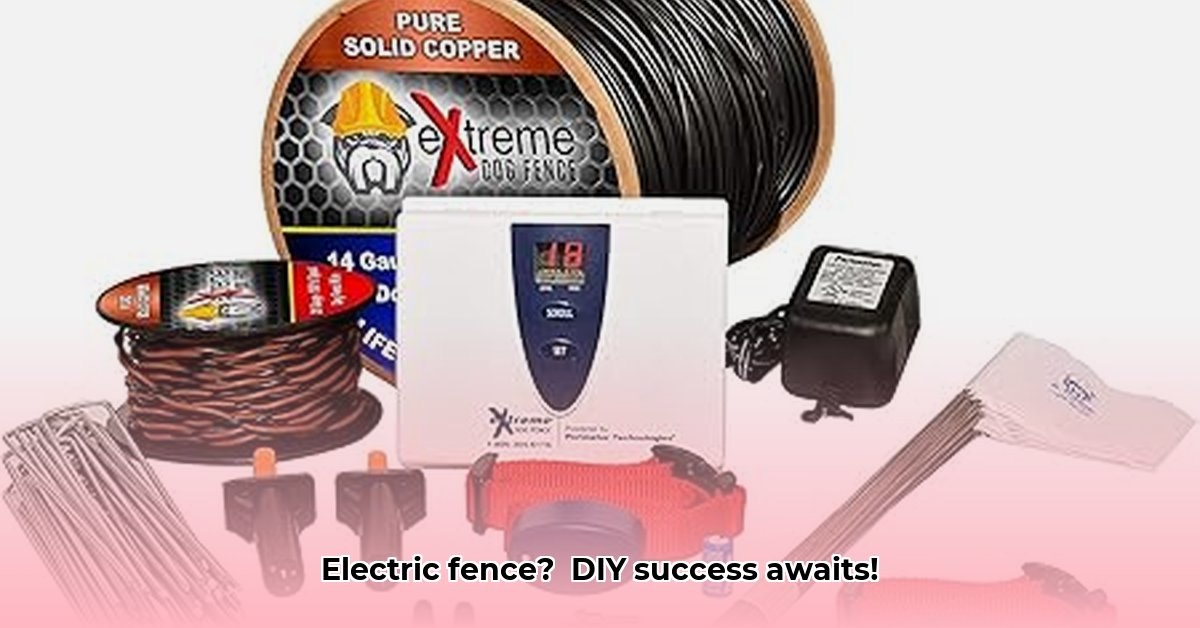
Choosing the Right Electric Fence Wire
Tractor Supply offers various electric fence wires; selecting the best one depends on your needs. Consider these options:
Poly Wire: Lightweight and flexible, ideal for smaller areas or temporary fences. Its ease of use makes it perfect for beginners.
High-Tensile Wire: Durable and strong, suitable for larger properties or demanding terrains. This option offers superior longevity and withstands significant stress.
Braided Wire: A robust choice, excellent where brush or rough terrain prevails. Its resistance to snagging makes it a reliable option in challenging environments.
Before purchasing, assess your property size, the animals you're fencing, and environmental conditions. A stronger wire in a harsh environment will offer better long-term value. Don't underestimate the importance of choosing the right wire—it's the foundation of your fence's effectiveness. Are you prioritizing ease of installation or maximum durability? This decision impacts your overall fence success.
Essential Tools and Materials
Before you begin, gather these supplies from Tractor Supply or a local hardware store:
- Electric Fence Wire: Choose the type and gauge based on your needs (see above).
- Insulators: Essential for preventing shorts by keeping the wire off the ground.
- Fence Posts: Select from wood, metal, or fiberglass, according to your preferences and budget.
- Energizer: The power source; ensure its capacity matches your fence size.
- Wire Cutters/Strippers: Crucial for neat, safe wire preparation.
- Grounding Rod: Essential for grounding the energizer, ensuring safety and performance.
- Connectors: For securely joining wire sections.
- Measuring Tape: Accurate measurements are key for effective fence construction.
- Post Hole Digger or Driver: For setting posts firmly into the ground.
Having all your materials organized and ready will significantly streamline the installation process and minimize potential delays. Is your toolkit complete? Checking beforehand prevents mid-project disruptions.
Step-by-Step Electric Fence Installation
Follow these steps for successful installation:
- Planning: Map your fence line, noting obstacles. A simple sketch can be invaluable.
- Post Placement: Set posts firmly and evenly spaced, following wire packaging guidelines or online resources for proper spacing recommendations.
- Insulator Attachment: Securely fasten insulators to each post to maintain proper wire clearance.
- Wire Stringing: Tightly string the wire through the insulators, ensuring consistent tension for optimal effectiveness.
- Grounding: Connect the grounding rod to the energizer; a solid connection is critical for safety and performance.
- Energizer Connection: Connect the wire to the energizer (always with the energizer OFF!). Refer to your energizer's manual for specific instructions.
- Testing: Use a fence tester to verify the fence is delivering the correct charge.
Safety is paramount! Always disconnect the energizer before making adjustments or repairs. Never touch the wire while the energizer is ON.
Maintenance and Troubleshooting
Regular inspection (at least weekly) is essential. Check for:
- Broken wires: Repair or replace immediately.
- Damaged insulators: Replace any damaged or cracked insulators.
- Loose connections: Tighten to prevent power loss and shorts.
- Overgrown vegetation: Trim vegetation near the wire to avoid short circuits.
| Problem | Possible Cause(s) | Solution(s) |
|---|---|---|
| Weak or No Shock | Low battery, poor grounding, broken wire | Check battery, check grounding, repair broken wire |
| Short Circuit | Wire touching ground, vegetation contact | Move the wire, clear the vegetation |
| Energizer Malfunction | Internal issue, power outage | Check energizer; contact the manufacturer |
Frequently Asked Questions (FAQs)
How often should I inspect my fence? Weekly inspections are recommended, with more frequent checks during inclement weather.
What wire gauge should I use? Consult a Tractor Supply expert for guidance tailored to your specific needs.
How long does electric fence wire last? Longevity depends on wire type, maintenance, and environmental factors; high-tensile wire typically outlasts other types.
By following this guide and performing regular maintenance, you can create and maintain a safe and effective electric fence for your livestock. Careful planning and attention to detail are key to long-term success.